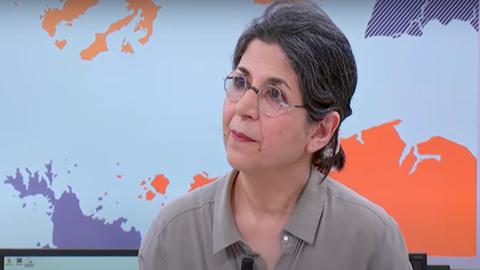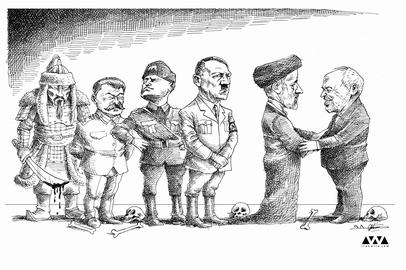Fariba Adelkhah, an Iranian-French researcher who was arrested by the Revolutionary Guards intelligence agents in July, has been allowed to meet with French consulate officials in Iran and see her family, IranWire has learned.
Adelkhah told her family, who she met in July, that she had not been mistreated while in prison. The meeting with the French consulate also took place in July, though the news has just emerged now.
Although her family welcomed the news she was not being badly treated, there is no further news available about her case. French officials have reportedly appealed to the Iranian-French academic community to remain silent about the arrest so that negotiations between the two countries can progress. The French media has not reported on the negotiations or on Adelkhah’s case.
But a long-time friend and former colleague of Adelkhah’s, Jean-Franc̜ois Bayart, issued a statement in July saying he had been in touch with her family. Bayart, the former president of the Ciri Research Center, also confirmed the meeting between the French consulate and the imprisoned dual national. He said he assured her — presumably via her family — that the French government was diligently pursuing her case.
However, the research institute that Fariba Adelkhah was working with at the time of her arrest has not issued a statement about her arrest nor made her research permit public. Researchers intending to work in field research on Iran require a research permit, and the fact that no such document has been forthcoming has fueled rumors that she was conducting field research in Iran without a valid permit.
This issue, along with the researcher’s relationship with the Islamic Republic and its regime in recent years, has raised suspicions and consternation with Iranian and French nationals alike. Jean-Franc̜ois Bayart says in his statement that Adelkhah never expressed critical or oppositional views about the Islamic Republic. Her work was popular among many Iranians, with some of her interviews and her writing going viral, both of which did not express any criticism of the regime or the government.
Police Unable to Verify Information
Fariba Adelkhah was residing in the religious city of Qom at the time of her arrest, and studying the city’s seminaries. According to some reports, a French student had been staying with her, but both governments have remained silent with regard to the rumor. Some believe the speculation that the case involves any other French national is unfounded.
IranWire contacted Qom’s police force in an attempt to glean further information about the case, but the police responded with the following: “This case is a matter of national security and therefore, we cannot provide any information. We are also unable to confirm or deny that the person in question was residing in Qom.”
It would appear that Fariba Adelkhah’s case will depend substantially on negotiations between the two states.
During a press conference in July, reporters asked an EU spokesperson and a French foreign affairs representative about the case. The reply, which was also published on the France Embassy’s website was as follows: “The French authorities were recently notified of the arrest of Fariba Adelkhah, who is a dual citizen of France and Iran. French authorities have approached the Iranian authorities for information on Ms. Adelkhah’s situation and arrest and to request consular access, as provided for in these circumstances – a necessary prerequisite for her swift release.” The Foreign Affairs Ministry further stated: “France wants Iran to resolve the situation regarding Fariba Adelkhah swiftly, and ask that she be in immediate contact with the French consulate.”
At the same time, French president Emmanuel Macron said in a separate press conference: “I’m very worried about what has happened. We have been in the dark about the situation for some time. I voiced my concerns and have asked Hassan Rouhani for explanations.”
Following on from the two statements, the meeting between Adelkhah and the French consulate was allowed to take place, but no details about the meeting have been released to the media. There has been some speculation that Emmanuel Macron will follow up on her case during a visit to Iran, and the media silence has been interpreted as an attempt to ensure negotiations will get the desired result faster.
A Wider Discontent
The arrest coincides with mounting tensions between Iran and the EU regarding US sanctions and the nuclear deal (the Joint Comprehensive Plan of Action), and some have argued that Adelkhah’s ordeal is simply another example of Iran taking dual nationals hostage in order to gain political leverage.
The most well-known examples include jailed Iranian-American dual nationals Siamak and Baqer Namazi and Iranian-British charity worker Nazanin Zaghari-Ratcliffe. Swedish resident Ahmad Reza Jalali and Belgium resident Hamid Babaei, who was recently released, have also been regarded as hostages held by the Iranian regime. They have all been held on trumped-up charges including espionage and conspiracy against national security.
The French government has a history of prisoner exchanges with Iran. Most recently, the two countries were suspected of exchanging Claudia Rice, who was arrested in 2009, with Ali Vakilirad, who was convicted of assassinating Shahpour Bakhtiar, the last prime minister under the Shah’s rule. However, the French government denied that any prisoner exchange happened at the time.
While many Iranian researchers based outside of the country are not able to travel to Iran, or if they do are given tight restrictions and red lines under which they have to work, Adelkhah was relatively free, and able to travel to Iran and Afghanistan frequently. She had established links with the clergy over an extended period of time and had good networks in the city. However, research into seminaries is a routine red line for the Iranian regime, and her work on Qom could have been the reason for her troubles.
Prior to the 2009 Green Movement that galvanized protests following that year’s presidential election, Adelkhah organized a seminar in Paris, to which she invited a number of Iranian researchers and scholars, including Farideh Mashini and Fakhri Mohtashamipour. One participant was a conservative clergyman who later, due to Adelkhah’s connections, arranged for her to travel to Iran and gave the green light for her research.
For now, information about Fariba Adelkhah remains limited. But the fact that she was in no way critical of the regime sounds another alarm bell for academics who intend to do what they believe is their part to help their country of birth. And the suspicions about her possible lack of permit will be of great concern for her family. At the same time, condemnation of her arrest has been widespread and vocal.
visit the accountability section
In this section of Iran Wire, you can contact the officials and launch your campaign for various problems

























comments